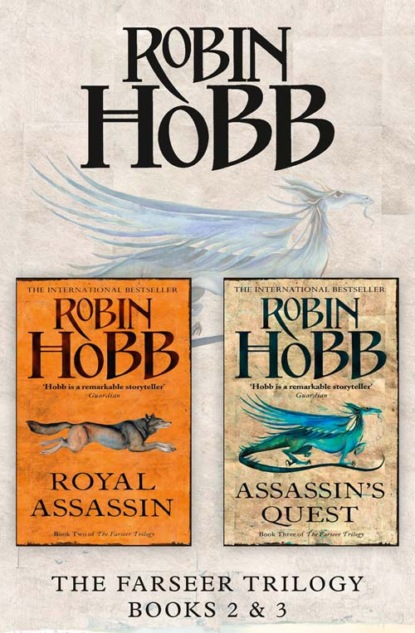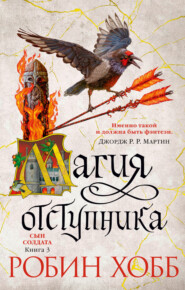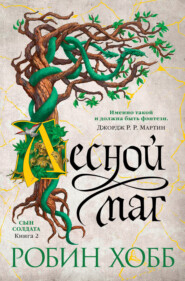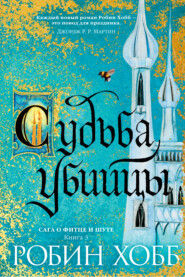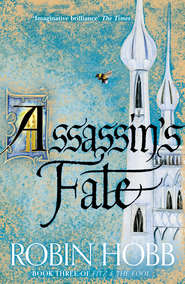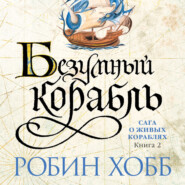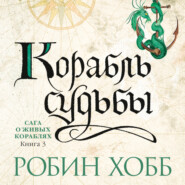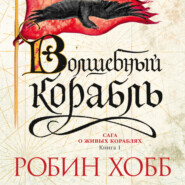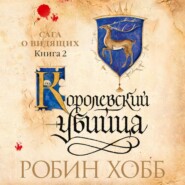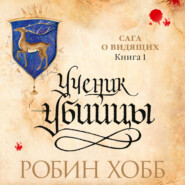По всем вопросам обращайтесь на: info@litportal.ru
(©) 2003-2024.
✖
The Farseer Series Books 2 and 3: Royal Assassin, Assassin’s Quest
Автор
Год написания книги
2018
Настройки чтения
Размер шрифта
Высота строк
Поля
‘Yet you have difficulty seeing it as a coordinated plan? Verity asked quietly.
‘I fail to see how they could have any plan at all. How have they contacted each other? And it doesn’t seem a concerted effort. They aren’t meeting up and travelling here in bands. It simply seems that each and every one sets out this way, and some of them fall in together.’
‘Like moths drawn to a candle flame,’ Verity observed.
‘Or flies to carrion,’ I added sourly.
‘The ones to fascination, the others to feed,’ Verity mused. ‘I wish I knew which it is that draws the Forged ones to me. Perhaps another thing entirely.’
‘Why do you think you must know why they come? Do you think you are their target?’
‘I do not know. But if I find out, I may understand my enemy. I do not think it chance that all the Forged ones make their way to Buckkeep. I think they move against me, Fitz. Perhaps not of their own will, but it is still a move against me. I need to understand why.’
‘To understand them, you must become them.’
‘Oh.’ He looked less than amused. ‘Now who sounds like the Fool?’
The question made me uneasy and I let it slip by me. ‘My prince, when the Fool mocked me the other day …’ I hesitated, still stung by the memory. I had always believed the Fool to be my friend. I tried to push the emotion aside. ‘He put ideas in my mind. In his teasing way. He said, if I understand his riddles aright, that I should be seeking for others who are Skilled. Men and women from your father’s generation, trained by Solicity before Galen became Skillmaster. And he seemed also to say that I should be finding out more about the Elderlings. How are they summoned, what can they do? What are they?’
Verity leaned back in his chair and steepled his fingers over his chest. ‘Either of those quests might be enough for a dozen men. And yet, neither is even sufficient for one, for the answers to either question are so scarce. To the first, yes, there should yet be Skilled ones amongst us, folk older than my father even, trained for the old wars against the Outislanders. It would not have been common folk knowledge as to who was trained. Training was done privately, and even those in a coterie might know of few outside their own circle. Still, there should have been records. I am sure there were, at one time. But what has become of them, no one can say. I imagine that they were passed from Solicity down to Galen. But they were not found in his room or among his things after he … died.’
It was Verity’s turn to pause. We both knew how Galen had died, in a sense had both been there, though we had never spoken much of it. Galen had died a traitor, in the act of trying to Skill-tap Verity’s strength and drain it off and kill him. Instead, Verity had borrowed my strength to aid him in draining Galen. It was not a thing either of us enjoyed recalling. But I spoke boldly, trying to keep all emotion from my voice.
‘Do you think Regal would know where such records are?’
‘If he does, he has said nothing of it.’ Verity’s voice was as flat as my own, putting an end to that topic. ‘But I have had some small success in uncovering a few Skilled ones. The names, at least. In every case, those I have managed to discover have either already died or cannot be located now.’
‘Um.’ I recalled hearing something of this from Chade some time ago. ‘How did you discover their names?’
‘Some my father could recall. The members of the last coterie, who served King Bounty. Others I knew vaguely, when I was very small. A few I discovered by talking to some of the very old folk in the keep, asking them to recall what rumours they could of who might have been trained in the Skill. Though of course I did not ask in so many words. I did not, and still do not, wish my quest to be known.’
‘May I ask why?
He frowned and nodded toward his maps. ‘I am not as brilliant as your father was, my boy. Chivalry could make leaps of intuition that seemed nothing short of magical. What I discover are patterns. Does it seem likely to you that every Skilled one I can discover should be either dead, or unfindable? It seems to me that if I find one, and his name is known as a Skilled one, it might not be healthy for him.’
For a time we sat in silence. He was letting me come to my own conclusions. I was wise enough not to voice them aloud. ‘And Elderlings?’ I asked at last.
‘A different sort of riddle. At the time they were written about, all knew what they were. So I surmise. It would be the same if you went to find a scroll that explained exactly what a horse was. You would find many passing mentions of them, and a few that related directly to shoeing one, or to one stallion’s blood-line. But who amongst us would see the need to devote the labour and time to writing out exactly what a horse is?’
‘I see.’
‘So, again, it is a sifting out of detail. I have not had the time required to devote myself to such a task.’ For a moment he sat looking at me. Then he opened a little stone box on his desk and took out a key. ‘There is a cabinet in my bedchamber,’ he said slowly. ‘I have gathered there what scrolls I could find that made even a passing mention of the Elderlings. There are also some related to the Skill. I give you leave to pore through them. Ask Fedwren for good paper, and keep notes of what you discover. Look for patterns among those notes. And bring them to me, every month or so.’
I took the little brass key in my hand. It weighed strangely heavy, as if attached to the task the Fool had suggested and Verity had confirmed. Look for patterns, Verity had suggested. I suddenly saw one, a web woven from me to the Fool to Verity and back again. Like Verity’s other patterns, it did not seem to be an accident. I wondered who had originated the pattern. I glanced at Verity, but his thoughts had gone afar. I rose quietly to go.
As I touched the door, he spoke to me. ‘Come to me. Very early tomorrow morning. To my tower.’
‘Sir?’
‘Perhaps we may yet discover another Skilled one, unsuspected in our midst.’
TWELVE (#ulink_22f39c13-a393-5abd-ab5d-e048111189af)
Tasks (#ulink_22f39c13-a393-5abd-ab5d-e048111189af)
Perhaps the most devastating part of our war with the Red Ships was the sense of helplessness that overpowered us. It was as if a terrible paralysis lay over the land and its rulers. The tactics of the Raiders were so incomprehensible that for the first year we stood still as if dazed. The second year of raiding, we tried to defend ourselves. But our skills were rusty; for too long they had been employed only against the chance Raiders, the opportunistic or the desperate. Against organized pirates who had studied our sea-coasts, our watchtower positions, our tides and currents, we were like children. Only Prince Verity’s Skilling provided any protection for us. How many ships he turned aside, how many navigators he muddled or pilots he confused, we will never know. Because his people could not grasp what he did for them, it was as if the Farseers did nothing. Folk saw only the raids that were successful, never the ships that went onto the rocks or sailed too far south during a storm. The people lost heart. The Inland duchies bridled at taxes to protect a coastline they didn’t share; the Coastal duchies were laboured under taxes that seemed to make no difference. So if the enthusiasm for Verity’s warships was a fickle thing, rising and falling with the folk’s current assessment of him, we cannot really blame the people. It seemed the longest winter of my life.
I went from Verity’s study to Queen Kettricken’s apartments. I knocked and was admitted by the same little page girl as previously. With her merry little face and dark curly hair, Rosemary reminded me of some pool sprite. Within, the atmosphere of the room seemed subdued. Several of Kettricken’s women were there, and they all sat on stools around a frame holding a white linen cloth. They were doing edge-work on it, flowers and greenery done in bright threads. I had witnessed similar projects in Mistress Hasty’s apartments. Usually these activities seemed merry, with tongues wagging and friendly banter, needles flashing as they dragged their tails of bright thread through the heavy cloth. But here, it was near silent. The women worked with their heads bent, diligently, skilfully, but without gay talk. Scented candles, pink and green, burned in each corner of the room. Their subtle fragrances mingled scents over the frame.
Kettricken presided over the work, her own hands as busy as any. She seemed the source of the stillness. Her face was composed, even peaceful. Her self-containment was so evident I could almost see the walls around her. Her look was pleasant, her eyes kind, but I did not sense she was really there at all. She was like a container of cool, still water. She was dressed in a long simple robe of green, more of the Mountain style than of Buckkeep. She had set her jewellery aside. She looked up at me and smiled questioningly. I felt like an intruder, an interruption to a group of studying pupils and their master. So instead of simply greeting her, I tried to justify my presence. I spoke formally, mindful of all the watching women.
‘Queen Kettricken. King-in-Waiting Verity has asked me to bring a message to you.’
Something seemed to flicker behind her eyes, and then was still again. ‘Yes,’ she said neutrally. None of the needles paused in their jumping dance, but I was sure that every ear waited for whatever tidings I might be bringing.
‘Upon a tower there was once a garden, called the Queen’s Garden. Once, King Verity said, it had pots of greenery, and ponds of water. It was a place of flowering plants, and fish, and wind chimes. It was his mother’s. My queen, he wishes you to have it.’
The stillness at the table grew profound. Kettricken’s eyes grew very wide. Carefully, she asked, ‘Are you certain of this message?’
‘Of course, my lady.’ I was puzzled by her reaction. ‘He said it would give him a great deal of pleasure to see it restored. He spoke of it with great fondness, especially recalling the beds of flowering thyme.’
The joy in Kettricken’s face unfurled like the petals of a flower. She lifted a hand to her mouth, took a shivering breath through her fingers. Blood flushed through her pale face, rosing her cheeks. Her eyes shone. ‘I must see it,’ she exclaimed. ‘I must see it now!’ She stood abruptly. ‘Rosemary? My cloak and gloves, please.’ She beamed about at her ladies. ‘Will not you fetch your cloaks and gloves also, and accompany me?’
‘My queen, the storm is most fierce today …’ one began hesitantly.
But another, an older woman with a motherly cast to her features, Lady Modesty, stood slowly. ‘I shall join you on the tower top. Pluck!’ A small boy who had been drowsing in the corner leaped to his feet. ‘Dash off and fetch my cloak and gloves. And my hood.’ She turned back to Kettricken. ‘I recall that garden well, from Queen Constance’s days. Many a pleasant hour I spent there in her company. I will take joy in its restoration.’
There was a heartbeat’s pause, and then the other ladies were taking similar action. By the time I had returned with my own cloak, they were all ready to go. I felt distinctly peculiar as I led this procession of ladies through the keep, and then up the long climb to the Queen’s Garden. By then, counting the pages and the curious, there were nearly a score of people following Kettricken and me. As I led the way up the steep stone steps, Kettricken was right on my heels. The others trailed out in a long tail behind us. As I pushed on the heavy door, forcing it open against the layer of snow outside, Kettricken asked softly, ‘He’s forgiven me, hasn’t he?’
I paused to catch my breath. Shouldering the door open was doing the injury on my neck no good at all. My forearm throbbed dully. ‘My queen?’ I asked in reply.
‘My lord Verity has forgiven me. And this is his way of showing it. Oh, I shall make a garden for us to share. I shall never shame him again.’ As I stared at her rapt smile, she casually put her own shoulder to the door and shoved it open. While I stood blinking in the chill and the light of the winter day, she walked out onto the tower top. She waded through crusted snow calf-high, and paid it no mind at all. I looked around the barren tower top and wondered if I had lost my mind. There was nothing here, only the blown and frozen snow under the leaden sky. It had drifted up over the discarded statuary and pots along one wall. I braced myself for Kettricken’s disappointment. Instead, in the centre of the tower top, as the wind swirled the falling flakes around her, she stretched out her arms and spun in a circle, laughing like a child. ‘It’s so beautiful!’ she exclaimed.
I ventured out after her. Others came behind me. In a moment Kettricken was by the tumbled piles of statuary and vases and basins that were heaped along one wall. She brushed snow from a cherub’s cheek as tenderly as if she were its mother. She swept a load of snow from a stone bench, and then picked up the cherub and set it upon it. It was not a small statue, but Kettricken used her size and strength energetically as she extricated several other pieces from the drifted snow. She exclaimed over them, insisting that her women come and admire them.
I stood a little apart from them. The cold wind blew past me, awakening the pain in my injuries and bringing me hard memories. Here I had stood once, near naked to the cold, while Galen had tried to hammer the Skill ability into me. Here I had stood, in this very spot, while he beat me as if I were a dog. And here I had struggled with him and, in the struggle, burned and scarred over whatever Skill I had once had. This was a bitter place to me still. I wondered if any garden, no matter how green and peaceful, could charm me if it stood upon this stone. One low wall beckoned me. Had I gone to it and looked over the edge, I knew I would look down on rocky cliffs below. I did not. The quick end that fall had once offered me would never tempt me again. I pushed Galen’s old Skill-suggestion aside. I turned back to watch the Queen.
Against the white backdrop of snow and stone, her colours came alive. There is a flower called a snowdrop, that sometimes blooms even as the banked snows of winter are retreating. She reminded me of one. Her pale hair was suddenly gold against the green cloak she wore, her lips red, her cheeks pink as the roses that would bloom here again. Her eyes were darting blue jewels as she excavated and exclaimed over each treasure. In contrast, her dark-tressed ladies with eyes of black or brown were cloaked and hooded against the winter chill. They stood quietly, agreeing with their queen and enjoying her enjoyment, but also rubbing chilled fingers together, or holding cloaks tightly closed against the wind. This, I thought, this is how Verity should see her, glowing with enthusiasm and life. Then he could not help but love her. Her vitality burned, even as his did when he hunted or rode. Or had once.
‘It is, of course, quite lovely,’ one Lady Hope ventured to say. ‘But very cold. And there is little that can be done here until the snow melts and the wind grows kinder.’
‘Oh, but you are wrong!’ Queen Kettricken exclaimed. She laughed aloud as she straightened up from her treasures, walked again to the centre of the tower top. ‘A garden begins in the heart. I must sweep the snow and ice from the tower top tomorrow. And then, all these benches and statues and pots must be set out. But how? Like the spokes of a wheel? As a charming maze? Formally, by variation of height and theme? There are a thousand ways they could be arranged, and I must experiment. Unless, perhaps, my lord will remember it for me just as it once was. Then I shall restore it to him, the garden of his childhood!’
‘Tomorrow, Queen Kettricken. For the skies grow dark, and colder,’ advised Lady Modesty. I could see what the climb followed by standing in the cold had cost the older woman. But she smiled kindly as she spoke. ‘I could, perhaps, tell you tonight what I remember of this garden.’
‘Would you?’ Kettricken exclaimed, and clasped both of her hands in her own. The smile she shed on Lady Modesty was like a blessing.
‘I should be glad to.’





